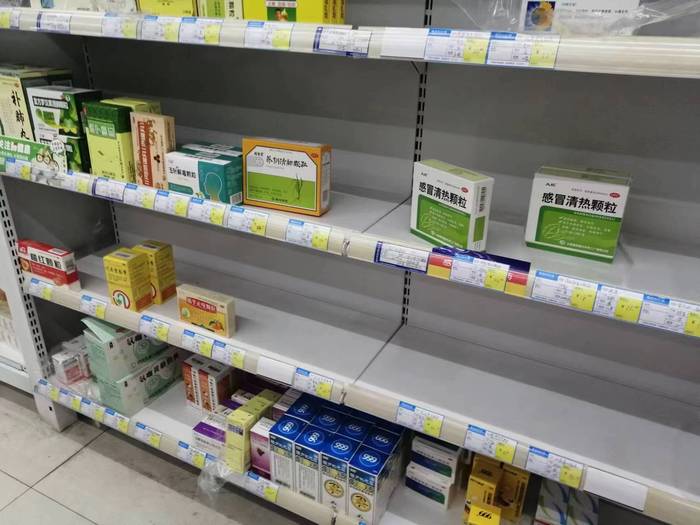A State Council guideline asks hospitals to better manage fever clinics, build more intensive care infrastructure, and train more doctors.

Photo from CFP
By ZHAO Meng, ZHANG Qiannan
As the Covid-19 cases continue mounting up, hospitals are under immense pressure. From small clinics in towns to major hospitals in big cities, doctors and nurses are battling Covid.
Jiemian News called the hotlines of more than 30 hospitals around China, most were busy or went unanswered. From the ones that were answered, doctors said the number of patients at fever clinics has doubled. They called for better infrastructure to sustain all patients at this very moment.
Hospitals are shifting their focus to severe Covid cases, as they train staff and build exclusive inpatient wards. In Beijing, Covid cases grow by thousands, if not more, each day. Renhe Hospital in suburban Daxing District said its fever clinic is open 24/7 for Covid cases, but if the patient has enough medicine at home, they advise them not to come. Dispensing medication is the only thing they can do for patients.
“There is always a long queue outside the clinic,” a doctor said. “People spend hours waiting in line.”
At a children’s hospital in Chengdu on Monday, more than 30 people were waiting in line for PCR test results. The number of patients was obviously on the rise, but the doctor said the hospital was coping just fine.

Xinhua Hospital in Wuhan, the capital of Hubei Province, has patients waiting for hours at its fever clinics, even at midnight. In another Wuhan hospital, the fever clinic is exclusively for Covid patients.
“Each day the policy changes, but rest assured we can take Covid patients now,” a doctor said. “But all we have are medicines to reduce symptoms, there is no cure to Covid, not yet.”
JIAO Yahui, deputy head of the Medical Policy and Administration Bureau under the National Health Commission (NHC), told a daily press conference on Wednesday that although the surge of Covid cases has put pressure on the supply of medicines and medical personnel, resources are still under control.
More than 14,000 hospitals and 33,000 clinics in China have opened fever clinics.
“Most patients came to the hospital for medicine. Hospitals have improved procedures to make it quicker for them to get the pills,” said Jiao. “At some hospitals, the waiting time is now down to 40 minutes from 4 hours.”
Smaller cities face bigger troubles. In Dazhou, southwest China, mass infections started more than a week ago. The local health authority had to temporarily shut down injection rooms to prevent the hospital from becoming too crowded, which would lead to more transmissions.
Some clinics ran out of medicine and were shut down entirely.
LIU Bo, deputy director of a hospital in Yunnan Province, said he has not been home for almost a month. Many people panicked because they don’t know much about Omicron, Liu said. Some of them bought too much medicine that they don’t really need, which partly caused a shortage.
Intensive care units may be the next to face pressure. Since December, hospitals have received orders to improve ICU resources, both equipment and personnel.
The State Council released a guideline in early December, asking hospitals to manage fever clinics better, build more intensive care infrastructure, prepare more doctors, and improve facilities such as makeshift wards.
Infrastructure is not a problem, but finding medical staff is challenging. Fever clinics in small towns hardly operate at all.
The State Council’s guideline ordered all major hospitals to have intensive care units for severe Covid patients.
For grade-3 hospitals, the highest level in China, beds for Covid patients should at least account for 4 percent of all beds. Intensive care units should be modified to meet the demands of infectious diseases. More ventilators should be stored for emergencies.
High risks, low profit, doctors do extra work for less reward, ICUs have been a weak spot in Chinese hospitals, along with the emergency department and pediatric department. In the past three years, hospitals have been focusing on how to make PCR tests more efficient instead of building better ICUs. But the doctors said, again, infrastructure is not a problem, people are.
Intensive care requires years of training and practice. In smaller hospitals, intensive care doctors come from other clinical areas.
Doctors don’t get to rest, even when they test positive and have a high fever. Under China’s new rules, doctors still need PCR negative results to go to work. A hospital manager said he did not understand why.
“It’s pointless to test doctors alone when you scrap the mass PCR test,” he said. “On the other hand, test positive or not, there is no cure to it anyway.” Since doctors are constantly exposed to environments with high loads of viruses, they get infected more than others.
If all infected staff are put under home quarantine, the already short-handed hospital will have huge problems. With medical staff infected, it has become more than an ethical problem: what if they collapse through fatigue?
As doctors are the most likely group to be infected, once they are, they should follow the “ten new policies,” rest at home and try to keep social interaction to a minimum.
Most doctors Jiemian News talked to said as of now, the majority of patients waiting in lines at the hospitals were the ones who couldn't get medicines. The pills are sold out in pharmacies. If the supply of medicine picks up, the pressure on hospitals will be largely relieved.